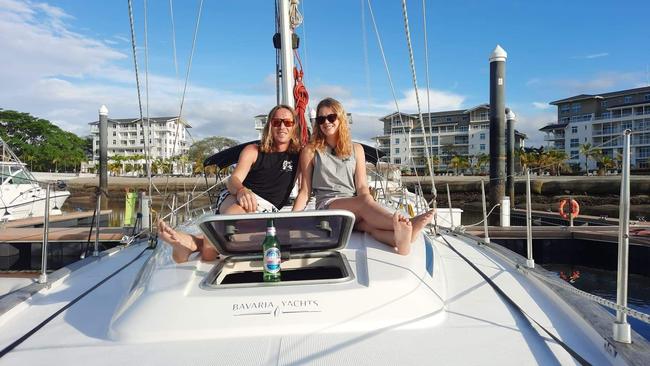Coronavirus: Australians stranded overseas find loophole to get home
Some of the 40,000 Australians stranded overseas have found a way to beat the queue: taking to the water to get home.

Boatpeople are heading for Australian shores again, setting sail in flimsy vessels, desperately seeking asylum in the face of a government that has turned its back on their plight — but these refugees are Australians, stranded overseas for more than a year and now willing to take any risk to return.
Prevented from flying home by astronomical ticket prices and crushing passenger caps, they’ve found a loophole: nobody said they couldn’t come by sea.
And so the trickle has become a steady stream: from tiny sail boats to super yachts, 156 vessels at last count have slipped quietly into Australian ports, the Australian Border Force has confirmed.
Tamara Ilic and Jake Shepherd are about to embark on what could be a five-month journey to get back to their home in the northern NSW border town of Tweed Heads.
Ms Ilic, 26, and Mr Shepherd, 31, will hoist sails at Rio Hato, on the coast of Panama, despite not having sailed a boat before. “There’s no way we could afford a $15,000 flight home, even if we were able to get a ticket,” she said. “This is really our only option.”
The pair are ready to set sail aboard China Plate on Monday along with “Skipper Trev”, another Australian desperate to be reunited with his daughter and family.
Initially stranded in Thailand working as tour guides, the couple planned to stay put and ride out the pandemic because “no one knew how long COVID would last”.
“We were told if we could stay where we were, then we should do so,” Ms Ilic said. “We had no idea it would eventually come to this.”
After receiving multiple amnesty visa extensions, the travellers were forced to leave Thailand and head anywhere that would take them. They landed in Panama, but have been unable to secure an affordable flight home.
“There are not many times you don’t want to be an Australian, but the worst thing you can hold at the moment is an Australian passport,” Mr Shepherd said.
The couple will work on board the 13m yacht in return for free passage. The boat has four cabins and can sleep eight people, although Trev still insists on sleeping on the couch, Ms Ilic said.
While their families are terribly worried about them, the couple are concerned only about the months of tinned beans and powdered milk.
“We couldn’t be more excited,” Ms Ilic said.
“We went for a sail the other day and it was just amazing. That’s nothing compared to what it would be in the open ocean.”
China Plate will first stop at the Galapagos Island, but due to unpredictable border restrictions, they don’t know where they will head next. “It’s completely up to the winds of the sea and our fearless skipper’s choice in route,” Mr Shepherd said. “The most we can do is week by week.”
On arriving in Australia, they will have to undertake 14 days of hotel quarantine, the same as other travellers.
When yachtsman Hugo Vaca sailed home to Australia from Indonesia with his partner Sally Adams last September, the pair were made to undergo two weeks of hotel quarantine despite having lived on their boat for three months.
“We asked if we could do our 14 days on-board our boat, but they wouldn’t let us,” Mr Vaca said.




To join the conversation, please log in. Don't have an account? Register
Join the conversation, you are commenting as Logout